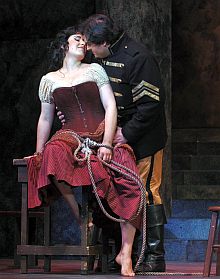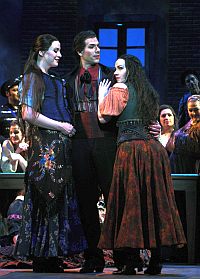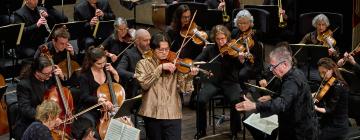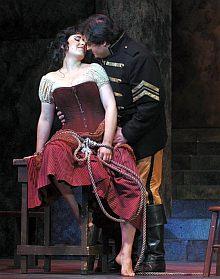With opera companies across the country feeling the pinch of the economic downturn, it makes sense to produce bankable hits such as Bizet’s 1875 melodrama. Carmen, as marketing types are fond of reminding us, has long been the most popular work in the repertoire, and this production, which opened Saturday at the California Theatre, will no doubt exceed expectations at the box office.

and Alexander Boyer as Don José
Photos by Pat Kirk
Yet there are no guarantees when it comes to Carmen, and Saturday’s performance, despite the company’s best efforts, missed a measure of the opera’s seductive power.
The production — Opera San José’s final offering of the 2008-2009 season — boasts assured musical direction by David Rohrbaugh, efficient staging by Sandra Bengochea, and capable performances throughout the cast (a second cast will alternate in the remaining performances, though May 3).
The evening was lacking in the one element that makes any Carmen great: a sense of dramatic urgency. Without that heat to drive the action onstage, the production seldom rose above the routine.
The deficiencies were most keenly felt where they mattered most — in the title role. Cybele Gouverneur’s Carmen performed with poise and considerable technique, but invested the Gypsy protagonist with little depth or fire.
A statuesque, doe-eyed beauty who bears a passing resemblance to the young Ava Gardner, Gouverneur certainly has the makings of a strong Carmen. Saturday, she introduced a large, velvety mezzo voice marked by rich, dusky tones and the high extensions that the role demands. If the voice occasionally emerged a little occluded in the lower reaches of her range, Gouverneur, for the most part, sounded voluptuous; the “Habanera” was sung with plush tone and smooth line that augured well for the rest of the evening.
Yet Gouverneur was lacking in the fiery volatility that characterizes the best Carmens. Act 1’s slashing of her fellow cigarette girl aside, her demeanor was oddly restrained, and her default expression was a placid, unruffled smile. Hers is a nice Carmen ... which is utterly at odds with the role. Not surprisingly, Gouverneur’s best moments were introspective ones; the Card Scene, for instance, came across with dark, moving potency. (Betany Coffland will assume the role April 25 and May 1 and 3.)
Tenor in Search of a Character
As her Don José, Alexander Boyer also struggled to achieve verisimilitude. Despite a tendency to lose tone at full volume, the tenor’s warm, elegant singing was a decided asset (the “Flower Song” was both smooth and ardent), but he, too, seemed still in search of a character, and his scenes with Gouverneur had an awkwardly muted quality.
Krassen Karagiozov as Escamillo,
and Jillian Boye as Frasquita
Rebecca Davis was simply miscast as Micaela, Don José’s village sweetheart. The soprano, who sang a lovely Fiordiligi for this company earlier in the season, returned Saturday sounding strained. Her Act 1 duet with Boyer lacked the requisite delicacy, and her scene in the Gypsy camp was unfocused and acidic.
As Escamillo, Krassen Karagiozov mustered some swagger, though not much of the toreador’s charisma or vocal heft. Silas Elash was a boorish, vocally unsteady Zuniga. Adam Meza was a sturdy Morales. As the Gypsy girls Mercedes and Frasquita, Alicia Lynch and Jillian Boye sang with charm. The chorus, under the direction of John Kendall Bailey, sounded well-rehearsed and vibrant, and the Vivace Youth Chorus, prepared by Peggy Spool, made essential contributions.
Stage director Sandra Bengochea — a soprano who has sung with the company as Sandra Rubalcava — wisely avoids most of the worst excesses that can mar productions of this opera, though her decision to have Carmen and Don José end their Act 2 tussle on the floor didn’t flatter anyone. Lise la Cour’s choreography enlivened key scenes. The opera is staged on Giulio Cesare Perrone’s attractive set of stone steps backed by three keyhole arches, adapted for successive scenes in the tavern and the Gypsy camp by Kent Dorsey’s excellent lighting scheme. The final tableau, outside the Seville arena, achieved the opera’s marriage of personal drama and public spectacle with admirable results.
Yet, throughout much of the three-hour performance (with two intermissions), it was left to Rohrbaugh to supply the drama of this Carmen. The conductor and his orchestra rose to the occasion with verve and focus. Rohrbaugh set the tone right out of the gate with a brisk, bracing Overture; the big set pieces made the blood race, and the Act 3 quintet was impressively shaped. The Act 3 entr’acte, which always seems to arrive like a balmy spring breeze, exerted its customary allure. In the orchestra’s performance, at least, there was ample evidence to support claims for Carmen’s enduring supremacy.

